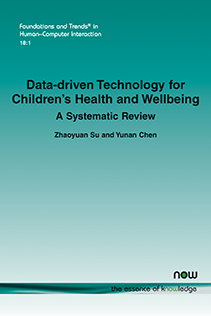Data-Driven Technology for Children’s Health and Wellbeing: A Systematic Review
By Zhaoyuan Su, University of California, Irvine, USA, nick.su@uci.edu | Yunan Chen, University of California, Irvine, USA, yunanc@uci.edu
Abstract
As data-driven health technologies such as mobile health apps, wearable devices, and smart medical devices advance and become more pervasive, the datafication of personal health research has grown substantially in recent years. However, the field has primarily focused on adult users, leaving a limited understanding of children’s data practices and technology for managing their health and well-being. Given children’s unique skills, needs, and experiences concerning technology use and self-care compared to adults, it is crucial to explore their perspectives on personal health datafication. Such inquiry will help bridge the knowledge gap and inform the development of age-appropriate, engaging, and effective health technologies that cater to children.
In this work, we first present an overview of the history of personal health datafication research, child development theories, and child-computer interaction studies, primarily focusing on HCI. Subsequently, we conducted a systematic literature review to understand the broader landscape and identify opportunities for future research on data-driven technology for children’s health. We analyzed health datafication papers centered on children (birth to 18 years old) that appeared in ACM’s library, IEEE Xplore, and PubMed from 2011 to 2021. This work contributes to the literature by (1) characterizing the trends in children’s health datafication research, including identifying dimensions and study characteristics that received wide attention, as well as areas that are underexplored, (2) reflecting on key research themes to guide future health datafication research focused on children, and (3) providing recommendations for future research and design of data-driven technologies that support children’s health and wellbeing.
Data-Driven Technology for Children’s Health and Wellbeing: A Systematic Review
Data-driven health informatics technologies such as mobile health apps and wearable and smart medical devices have become ubiquitous in people's daily lives. As these technologies advance and become more pervasive, the datafication of personal health research has grown substantially in recent years. The field is however primarily focused on adult users, leaving a limited understanding of children's data practices and technology for managing their health and well-being. In this work, the authors aim to delve deeper into children's health datafication practices, navigating the landscape of their technology use, caregiver involvement, and the distinct factors associated with their development and literacy. The authors’ intention is to catalyze future innovations, improving the design and utility of health technologies tailored for children.
The authors present an overview of the history of personal health datafication research, child development theories, and child-computer interaction studies. This work contributes to the literature by characterizing the trends in children's health datafication research, reflecting on key research themes to guide future health datafication research focused on children, and by providing recommendations for future research and design of data-driven technologies that support children's health and wellbeing.
